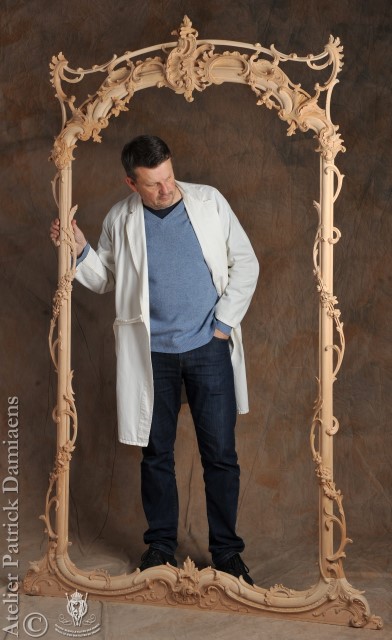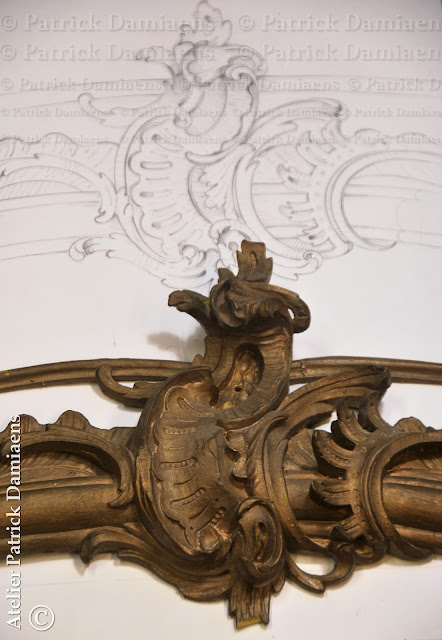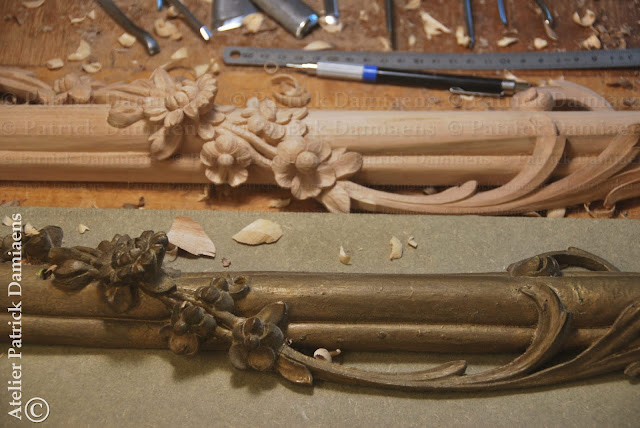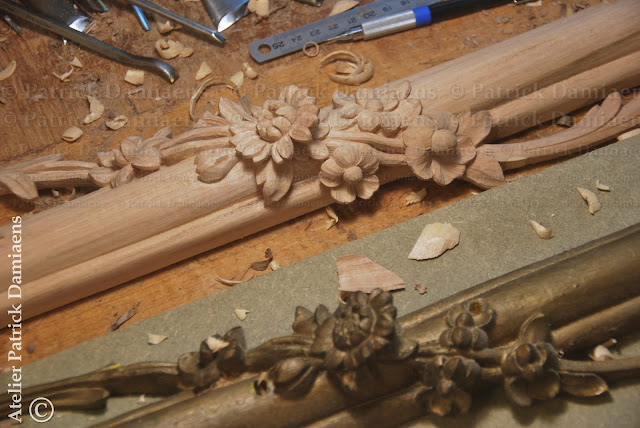 |
| Carving a Rococo mirror frame | Patrick Damiaens, ornamental woodcarver |
Carving a
Rococo style mirror in wood
Wooden
mirror for above a mantelpiece
Gilded Rococo mirror frame
A blogentry from this site:
We always
start with a design, my creation of a Rococo mirror frame was based on an
example made in polyester. This polyester copy had been hanging in my client's
living room for 25 years.
If you think long term, polyester is not a good
investment, it hasn't had a long life, small and medium sized parts and pieces
broke off from the mirror for quite some time now, the whole Rococo mirror was
actually falling apart, and becoming sprinkly.
So it was time to replace it and
the only option was for the customer to make an (improved) copy of the
polyester model.
It is
always nice to be able to make a nice design, this Rococo mirror is meant as
decoration for a marble mantelpiece, sometimes you can see this kind of mirrors
in a wooden trumeau, this one is about 2 meters high and 120 wide and intended
for a house in the Netherlands.
Rococo is one of the more difficult styles to reproduce. Horizontal lines are
almost non-existent, they are replaced by delicate curves, long drawn or pulled acanthusleaf motifs and many rocailles motifs merge into one another. Asymmetry is the strong
point of this style.
The effect is capricious, marvelous, captivating and
enchanting. It is a style that appeals more to the senses, less to the
intellect and emphasizes beauty over content.
Placing a drawing on the wood
The
preparation of the lime wood construction of the mirror, the sawing and the
various operations with the router has taken a lot of time. Accuracy is
important in every phase at this stage and that starts with transferring the drawing
of the Rococo mirror to lime paper, by means of carbonless paper or hand film,
the design of the Rococo mirror is transferred to the wood.
Remember this
drawing is very important and you should definitely check it carefully (on lime
paper and on the wood) to make sure that all the lines of the design are
present.
Even a not unimportant..., a bad design or drawing can only lead to a
bad end result. All stages in this phase of the creation are linked to each
other, if you forget something or if you prepare something badly, this will
have consequences at a later stage.
The four separate parts are glued to an MDF
board, between the wood of the mirror and the MDF board is a newspaper or
ordinary paper glued, this will ensure that after finishing the cutting work
the part of the mirror is easily detached from the MDF board.
The carving of the ornaments happens in this case with the drawing and the polyester
example on the workbench. With an altimeter we take crucial measurements on the
original and transfer these reference heights to the lime wood.
The large frame
is cut first and then serves as a reference for and Rococo design of the
ornaments, these ornaments have specific names, such as rocaille, acanthus leaf
motif, agraphe, etc.... Each stage in the carving of an ornament is
important but we start with the rough shaping of the whole and gradually
refine it, until we are satisfied with design and finishing.
When the visible
front of each part, in this case four pieces, is ready we turn the piece
around, put it in a blanket and start cutting the back, the excess wood behind
the ornament is removed and the Rococo ornament begins to come loose visually,
you look sideways no longer against a mass of wood, and all attention goes to
the ornament itself. What remains are the four transitions of the parts, making
sure that mouldings and ornaments merge smoothly into one another.
This Rococo
mirror frame will still be provided with gold leaf, but that's another
specialisation that will be done by another craftsman.
Rococo
The rococo style is a European style period that reached its peak between 1730 and 1760. The name rococo is derived from the French word rocaille: an asymmetrical shell motif that was widely used in the mid-18th century on furniture, doors, panelling, etc..
The word rocaille goes back to the French words roc (rock) and coquilles (shells) and indicates that it is mainly a decorative style.
Rococo originated in France as a reaction to the severe classicist baroque of around 1700.
The subsequent Rococo style is characterised by grace, elegance, charm, wit and playful eroticism. The style remained popular for over seventy years in the eighteenth century. After that, the style of neoclassicism gradually made its appearance and the rococo style disappeared.
As many styles have received their names in art history, the name rococo was initially intended to be mocking. The word refers to decorative shell shapes from the Baroque period.
Despite the many commissions, the Rococo artists were severely criticised. Opponents felt that their works of art were not serious enough in terms of content. Moreover, it was thought to be too much in the service of the decadent upper class. Therefore, the Rococo was mainly regarded as a decorative style.
WIKI
Rococo, less commonly Late Baroque, is an exceptionally ornamental and theatrical style of architecture, art and decoration which combines asymmetry, scrolling curves, gilding, white and pastel colors, sculpted molding, and trompe l'oeil frescoes to create surprise and the illusion of motion and drama. It first appeared in France and Italy in the 1730s and spread to Central Europe in the 1750s and 1760s. It is often described as the final expression of the Baroque movement.
The Rococo style began in France in the first part of the 18th century in the reign of Louis XV as a reaction against the more formal and geometric Style Louis XIV. It was known as the style rocaille, or rocaille style. It soon spread to other parts of Europe, particularly northern Italy, Bavaria, Austria, other parts of Germany, and Russia. It also came to influence the other arts, particularly sculpture, furniture, silverware and glassware, painting, music, and theatre.
 |
| https://www.patrickdamiaens.info |





















Fabulous! Fabulous! Fabulous! I cannot find better words to describe the excellence of your carving, Patrick. ... and I am not even a great fan of Rococo. Simply fabulously beautiful work.
ReplyDeleteIt is so much more beautiful than the polyester one! Excellent descriptions and demonstration of your impeccable artistry.
ReplyDeleteGrant McMillan